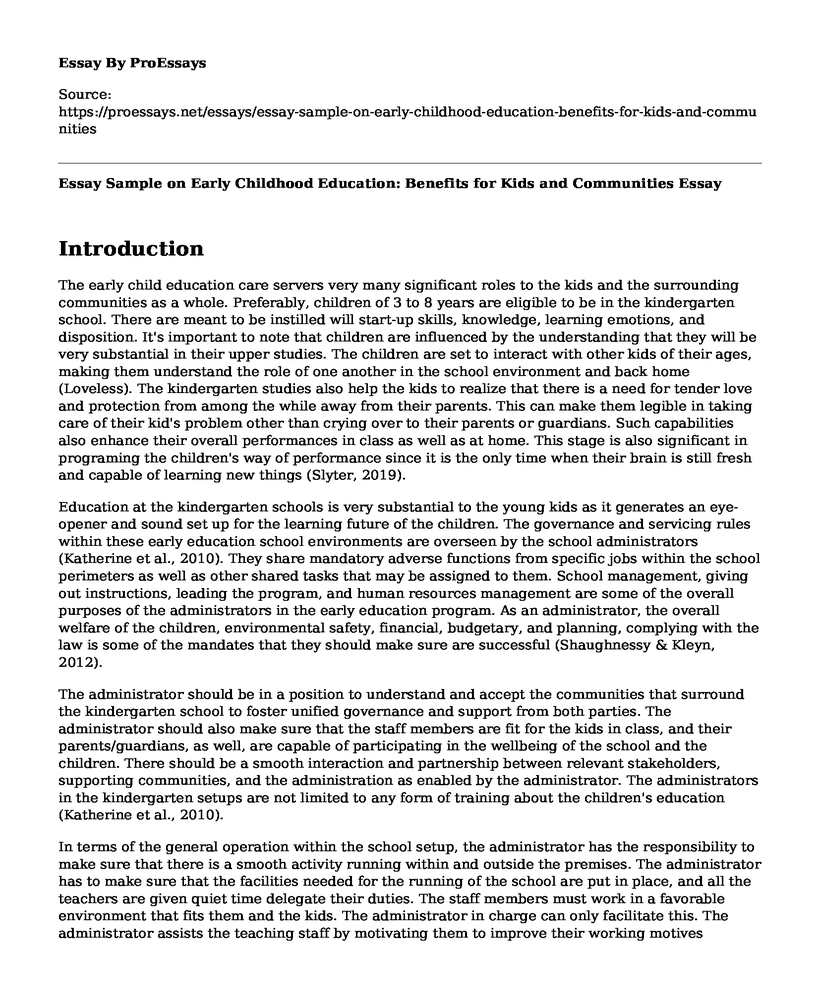Introduction
The early child education care servers very many significant roles to the kids and the surrounding communities as a whole. Preferably, children of 3 to 8 years are eligible to be in the kindergarten school. There are meant to be instilled will start-up skills, knowledge, learning emotions, and disposition. It's important to note that children are influenced by the understanding that they will be very substantial in their upper studies. The children are set to interact with other kids of their ages, making them understand the role of one another in the school environment and back home (Loveless). The kindergarten studies also help the kids to realize that there is a need for tender love and protection from among the while away from their parents. This can make them legible in taking care of their kid's problem other than crying over to their parents or guardians. Such capabilities also enhance their overall performances in class as well as at home. This stage is also significant in programing the children's way of performance since it is the only time when their brain is still fresh and capable of learning new things (Slyter, 2019).
Education at the kindergarten schools is very substantial to the young kids as it generates an eye-opener and sound set up for the learning future of the children. The governance and servicing rules within these early education school environments are overseen by the school administrators (Katherine et al., 2010). They share mandatory adverse functions from specific jobs within the school perimeters as well as other shared tasks that may be assigned to them. School management, giving out instructions, leading the program, and human resources management are some of the overall purposes of the administrators in the early education program. As an administrator, the overall welfare of the children, environmental safety, financial, budgetary, and planning, complying with the law is some of the mandates that they should make sure are successful (Shaughnessy & Kleyn, 2012).
The administrator should be in a position to understand and accept the communities that surround the kindergarten school to foster unified governance and support from both parties. The administrator should also make sure that the staff members are fit for the kids in class, and their parents/guardians, as well, are capable of participating in the wellbeing of the school and the children. There should be a smooth interaction and partnership between relevant stakeholders, supporting communities, and the administration as enabled by the administrator. The administrators in the kindergarten setups are not limited to any form of training about the children's education (Katherine et al., 2010).
In terms of the general operation within the school setup, the administrator has the responsibility to make sure that there is a smooth activity running within and outside the premises. The administrator has to make sure that the facilities needed for the running of the school are put in place, and all the teachers are given quiet time delegate their duties. The staff members must work in a favorable environment that fits them and the kids. The administrator in charge can only facilitate this. The administrator assists the teaching staff by motivating them to improve their working motives (Katherine et al., 2010). The surrounding communities and parents are the custodians of the preparatory schools. This implies that they are bond to the functionality of the school and must be considered for the running of the school. The administrator has the mandate to strengthen the relationship between the school administration and the parents of the children.
Conclusion
In conclusion, preparatory schools are fit for all the children before they set foot at their primary schools. The kindergarten school prepares them, foundationally, for their future studies as well as their time of growing. The relevant administrators spearhead the functionality of these early childhood centers. The administrators are suitable for the running of the kindergarten schools and the overall linkage between the parents and the school.
References
Katherine, A. B. et al. (2010). The Building Blocks of Preschool Success.
Loveless, B. (ad). What Is So Important About Early Childhood Education?
https://www.educationcorner.com/importance-of-early-childhood-education.htmlSlyter, K. (2019). 5 Reasons Why the Importance of ECE Is Impossible to Ignore. https://www.rasmussen.edu/degrees/education/blog/importance-of-early-childhood-education/
Shaughnessy, F. M. & Kleyn, K. (2012). The Importance of Early Childhood Education. Eastern New Mexico University and Texas Tech University. https://www.researchgate.net/publication/233763048_The_Importance_of_Early_Childhood_Education
Cite this page
Essay Sample on Early Childhood Education: Benefits for Kids and Communities. (2023, Mar 27). Retrieved from https://proessays.net/essays/essay-sample-on-early-childhood-education-benefits-for-kids-and-communities
If you are the original author of this essay and no longer wish to have it published on the ProEssays website, please click below to request its removal:
- Speech on Ethnographic Study of Language Use in Interpersonal Communication
- Socio-Autobiography Essay
- Causes and Impacts of Racial Microaggressions and How Black Female Students Integrate These Experiences
- Autobiographical Sketch
- Essay Example on the Power of College Traditions: Building Shared Values & Identity
- School Safety: Exploring Crime & Perception in 'Fear of Science' by Garden Daniel - Essay Sample
- Essay Example on Tracking Physical Growth: Key to Understanding Children's Cognitive Development







